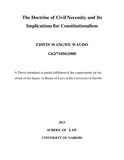| dc.description.abstract | While recognizing the need for emergency powers, the study acknowledges the tension that exists between emergency powers on the one hand and theprinciples of democracy and human rights on the other and examines whether it is possible to constitutionally provide for and control the exercise of emergency powers without constraining the government’s ability to adequately respond to unforeseen threats, while avoiding doing permanent damage to the norms and values underpinning constitutional government.
The study examines the arguments presented by those who hold the view that emergency powers cannot be regulated by law and those who maintain that emergency powers can and should be integrated into the state’s legal order. The study argues that the exercise of emergency powers can be regulated by law and suggests that it would be prudent to have detailed legal provisions providing for emergencies so that the extent and limits of the state’s emergency powers may be known in advance to prevent any abuse of emergency powers for political or any other ulterior purposes.
The study argues that the theory of written constitutionalism is incompatible with emergency exceptions. It argues that the application of the Doctrine of Civil Necessity in Kenya would violate not only the principle of the supremacy of the Constitution but also the principle of legality which requires that state authority be exercised pursuant to the Constitution and laws enacted in conformity therewith.It expresses the view that no legal justification exists for the application of the Doctrine of Civil Necessity as the law cannot possibly support actions which are contrary to it.
The study concludes with the finding that Constitutionalism is possible in times of emergency where the Constitutional Framework preserves the balance of powers between the various arms of Government even during the pendency of a state of emergency. It proposes legal reforms to decentralise the power to declare a state of emergency, clearly define the kind of situations that justify the invocation of emergency powers, provide for differentiated emergency powers and strengthen Parliament’s capacity to monitor the exercise of the executive’s emergency powers. | en |

